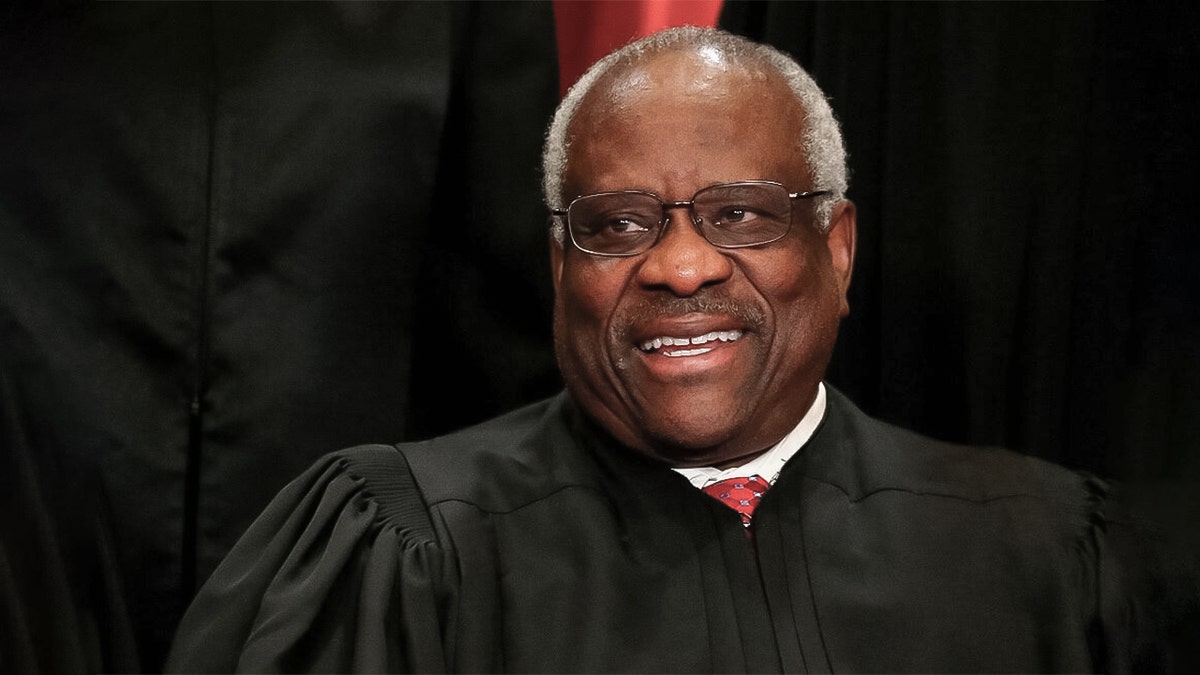This week marks the 30th anniversary of Clarence Thomas' confirmation to sit on the Supreme Court, and with it more than a generation of vitriolic attacks against the justice.
Michael Pack's 2020 documentary "Created Equal: Clarence Thomas in His Own Words," highlighted Thomas' impressive resume, while also putting a spotlight on the consistent barbs against the second Black man to reach the high court.
"Justice Thomas has been subject to the most racist and vile attacks since at least 1981 when he joined the Reagan Administration– all because he is a Black man who insists that he be allowed to have his own thoughts and ideas," Mark Paoletta, a former White House lawyer who worked on his confirmation, told Fox News Digital. "He believes in individual rights, not group rights, an idea that is literally enshrined in our Declaration of Independence. But because he holds those views, the Left and in particular the bankrupt civil rights groups, attack him."
Below are just some of the sharpest barbs on the 73-year-old justice throughout his career.
Reagan Administration
When Thomas joined the administration of President Ronald Reagan in the 1980s, Thomas was "attacked viciously by the left," Pack said.
Hodding Carter, a White former aide to President Jimmy Carter and a leading liberal journalist at the time Thomas was in the White House, published an article in Playboy in 1986 titled "Reagan and the Revival of Racism." Thomas responded with sharp criticism, and Carter's reply suggested he had no intention to backpedal.
"Mr. Thomas is surely familiar with those chicken-eating preachers who gladly parroted the segregationist's line in exchange for a few crumbs from the white man's table," he wrote. "He's one of the few left in captivity."
"Not a single civil rights leader objected to this nakedly racist language," Thomas wrote in response. "For daring to reject the ideological orthodoxy that was prescribed for blacks by liberal whites, I was branded a traitor to my race… if I refused to be another invisible man, then I wasn't really black. I was an Uncle Tom doing Massa's bidding. That wasn't politics, it was hate."
Confirmation Hearings
Testifying against his confirmation in 1991, Rep. Major Owens, D-N.Y., likened Thomas to Vidkun Quisling, the Norwegian military officer who collaborated with the Nazis.
Thomas was memorably accused of sexual harassment that year by Anita Hill while he supervised her at the Department of Education and Equal Employment Opportunity Commission. In one of the most wrenching confirmation processes in modern history, Thomas staunchly denied Hill's claims and went on to be narrowly confirmed. Hill's accusations continue to be debated to this day.
Supreme Court
On PBS in 1994, the political commentator Julianne Malveaux said of Thomas: "I hope his wife feeds him lots of eggs and butter and he dies early, like many black men do, of heart disease." She would later publish an apologetic op-ed, saying her comments were "in poor taste" and "out of line."

Clarence Thomas (Reuters/Jonathan Ernst)
Serving on the Supreme Court has not shielded Thomas from still being the subject of, at times, racially charged attacks. In November 1996, Emerge, a Black monthly news magazine, published a cartoon image of Thomas on its cover with the headline, "Uncle Thomas, Lawn Jockey for The Far Right"? When readers opened to the story, they found an even more racially charged cartoon that depicted him as a shoeshine boy to the late Justice Antonin Scalia. The article quoted retired U.S. Court of Appeals Chief Judge A. Leon Higginbotham Jr. as saying Thomas possesses "a level of racial self-hatred that is clinically observable."
Emerge editor George E. Curry was less-than-apologetic about their coverage, as well as some of the magazine's former unflattering features on the justice.
"I apologize," Curry wrote in an editor's note. "Exactly three years ago, shortly after I took over as editor of Emerge, we ran a cover illustration of U.S. Supreme Court Justice Clarence Thomas, resplendent with an Aunt Jemima-like handkerchief on his head. In retrospect, we were far too benevolent. Even our latest depiction is too compassionate for a person who has done so much to turn back the clock on civil rights, all the way back to the pre-Civil War lawn jockey days."
In 2005, Barron’s Educational Series Inc., the publisher of a standardized test preparation book, compared Thomas to the Ku Klux Klan, describing them both as "those who want things like they used to be."
Following backlash, Barron's said it would halt shipments, destroy the books and replace the graphic in its new books.
Rep. Bennie Thompson, D-Miss., was direct in an interview with CNN's Dana Bash in 2014, calling Thomas an "Uncle Tom" because his tenure on the Supreme Court had been "adverse to the minority community." Thompson suggested it was acceptable for him to use the term because he's Black.
"Well if you look at his decisions on the court, they have been adverse to the minority community," Thompson said. "And the people I represent have a real issue with an African American not being sensitive to those issues."
"Calling him an ‘Uncle Tom,’ though. Isn’t that a racially charged term?" Bash pressed.
"For some it is, but to others it’s the truth," Thompson said.
MSNBC's Joy Reid called Thomas "Uncle Clarence" during an Election Day panel discussion with colleagues Rachel Maddow and Nicolle Wallace last November, and Rep. Karen Bass, D-Calif., suggested he wasn't an authentic African-American voice in a 2016 interview.
Thomas' supporters have praised him for largely blocking out the invective.
CLARENCE THOMAS COMES OUT FAST WITH QUESTIONS IN NEW SUPREME COURT IN-PERSON ARGUMENT FORMAT
"Elite liberals have demeaned Justice Thomas—including with nasty racist undertones—since his earliest days at the Court when they characterized him as a blind follower of Justice Scalia," Judicial Crisis Network's Carrie Severino told Fox News Digital. "But for 30 years, Justice Thomas has demonstrated ultimate humility by focusing only on doing his job, and his impact on the Court has been transformative."
Fox News contributor Deroy Murdock also spoke admirably of Thomas, considering he's had to face hardship since his rough upbringing in the segregated South. Those details don't matter to leftists, he argued, because of his focus on originalism and opinions which are considered unpopular in the Black community.
"Clarence Thomas is a dark-skinned Black man who grew up dirt poor in the Jim Crow South," Murdock said. "He used an outhouse as a child. Despite overcoming racism and poverty, the Democrat Left dismisses him as a faux White man and trivializes his impressive professional accomplishments and incisive judicial opinions. For the Left, it's always about ideology. And if you look like Clarence Thomas, your lifetime of distinguished service is meaningless, and they will not recognize you as Black. Justice Thomas shames them each and every day he gets up and goes to work. He forever will be twice the man that his critics ever could aspire to be."
Paoletta agreed, saying, "To those groups and the liberal media’s great consternation, Justice Thomas has never backed down from his principles and what he believes in."
CLICK HERE TO GET THE FOX NEWS APP
Reacting to how he was treated earlier in his career in "Created Equal," Thomas mused he was the "wrong Black guy" to be in the spotlight and therefore "had to be destroyed."


